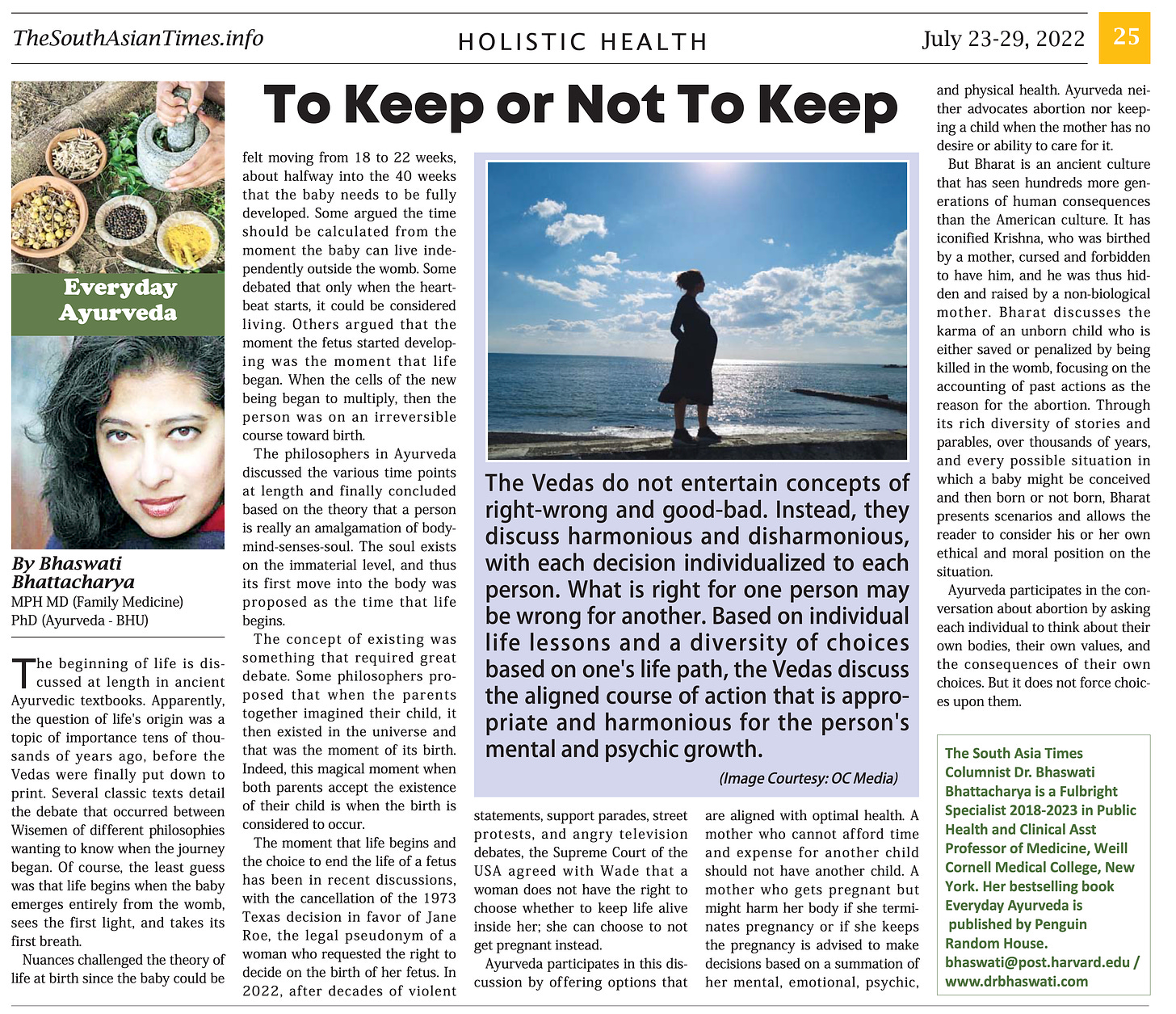To Keep or Not To Keep
The beginning of life is discussed at length in ancient Ayurvedic textbooks. Apparently, the question of life's origin was a topic of importance tens of thousands of years ago, before the vedas were finally put down to print. Several classic texts detail the debate that occurred between wisemen of different philosophies wanting to know when the journey began. Of course, the least guess was that life begins when the baby emerges completely from the womb, sees the first light and takes it first breath.
Nuances challenged the theory of life at birth since the baby could be felt moving from 18 to 22 weeks, about halfway into the 40 weeks that the baby needs to be fully developed. Some argued the time should be calculated from the moment the baby can live independently outside the womb. Some debated that only when the heart beat could it be considered living. Others argued that the moment the fetus started developing was the moment that life began. When the cells of the new being began to multiply, then the person was on an irreversible course toward birth.
The philosophers in ayurveda discussed the various timepoints at length and finally concluded based on the theory that a person is really an amalgamation of body-mind-senses-soul. The soul exists on the immaterial level, and thus its first movement into the body was proposed as the time that life begins.
The concept of existing was something that required great debate. Some philosophers proposed that when the parents together imagined their child, it then existed in the universe and that was the moment of its birth. Indeed, this magical moment when both parents accept the existence of their child is when birth is considered to occur.
The moment that life begins and the choice to end the life of a fetus has been in recent discussions, with the cancellation of the 1973 Texas decision in favor of Jane Roe, the legal pseudonym of a woman who requested the right to decide on the birth of her fetus. In the famous case Roe vs. Wade, Wade was the Dallas County district attorney who demanded that a woman does not have the right to decide on the fate of a life, once it is growing inside her. In 2022, after decades of violent statements, support parades, street protests, and angry television debates, the Supreme Court of the USA agreed with Wade that a woman does not have the right to choose whether to keep a life alive inside her; she can choose to not get pregnant instead.
The vedas do not entertain concepts of right-wrong and good-bad. Instead they discuss harmonious and disharmonious, with each decision individualized to each person. What is right for one person may be wrong for another. Based on individual life lessons and a diversity of choices based on one's life path, the vedas discuss the aligned course of action that is appropriate and harmonious for the person's mental and psychic growth. Ayurveda participates in this discussion by offering options that are aligned with optimal health. A mother who cannot afford time and expense for another child should not have another child. A mother who gets pregnant but might harm her body if she terminates pregnancy or if she keeps the pregnancy is advised to make decisions based on a summation of her mental, emotional, psychic and physical health. Ayurveda neither advocates abortion nor the keeping of a child when the mother has no desire or ability to care for it.
But Bharat is an ancient culture that has seen hundreds more generation of human consequence than the American culture. It has iconified Krishna, who was birthed by a mother cursed and forbidden to have him, and he was thus hidden and raised by a non-biological mother. Bharat discusses the karma of an unborn child who is either saved or penalized by being killed in the womb, focusing on the accounting of past actions as the reason for the abortion. Through its rich diversity of stories and parables, over thousands of years and every possible situation in which a baby might be conceived and then born or not born, Bharat presents scenarios and allows the reader to consider his or her own ethical and moral position on the situation.
Ayurveda participates in the conversation about abortion by asking each individual to think about their own bodies, their own values, and the consequences of their own choices. But it does not force choices upon them.
week 119. TheSouthAsianTimes
Download the .pdf version of this column by clicking on the image.
Dr. Bhaswati Bhattacharya is a Fulbright Specialist 2018‐2023 in Public Health, a family physician in the Department of Medicine at Weill Cornell Medical College in New York, NY, and holds doctorates in pharmacology and Ayurveda. She teaches ayurvedic nutrition on global platforms and cleans her channels regularly with sesame oil, mustard oil, and ghee.
Her bestselling book Everyday Ayurveda is published by Penguin Random House.
To order an autographed copy, write to bhaswati@post.harvard.edu.
To learn more, visit www.drbhaswati.com






